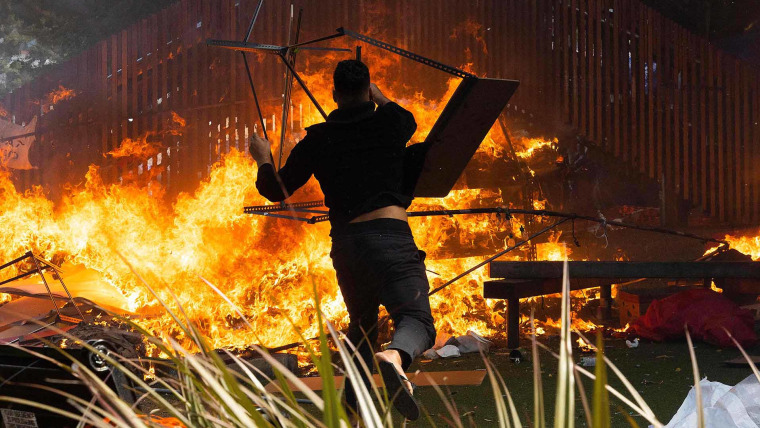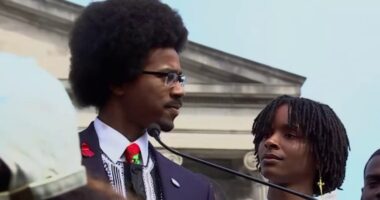This piece has been adapted from “Plagues and Their Aftermath,” by Brian Michael Jenkins.
Pandemics kill millions. Their effects, however, extend beyond mass mortality and widespread grief. History shows that pandemics leave long-lasting resentments. They expose and exacerbate existing inequities — the gap between rich and poor widens; minorities and women suffer more. Pandemics fuel pre-existing prejudices, deepen social divisions and increase political tensions.
Pandemics also cause political casualties — former President Donald Trump and former British Prime Minister Boris Johnson, to name just two obvious examples. A U.S. president presiding over a booming economy and low unemployment would ordinarily have enormous political advantages in a re-election campaign, but the pandemic sank the economy and sent unemployment skyrocketing. Across the pond, revelations of partying at Downing Street while the rest of the country was under lockdown contributed to Johnson’s downfall.
The post-pandemic world may be filled with people seeking saviors — fertile ground for false prophets and dictators — or with nihilists who have abandoned hope and believe in nothing.
Other leaders from Europe to Latin America have been politically wounded by their handling of the pandemic, as well. High death tolls owing to inadequate health care, unequal suffering, strict control measures and increased taxes as governments sought to make up revenue lost as a result of the pandemic sparked sometimes violent protests.
As the U.S. heads into the midterm elections, the parties should be prepared to face headwinds whichever side takes control of Congress. They should both beware that Covid-19’s biggest political casualty might be governability.
I expect that politics in the aftermath of the pandemic will increasingly be marked by defiance and intimidation. Political coalitions will be harder to assemble and hold together. National efforts will be feebler. Extreme beliefs will prevail. The post-pandemic world may be filled with people seeking saviors — fertile ground for false prophets and dictators — or with nihilists who have abandoned hope and believe in nothing. National consensus will be even harder to maintain.
To be sure, Covid-19 did not cause all of the problems currently on display. Many of the trends preceded the pandemic. The pandemic afflicted an already deeply divided American society, reflecting decades of increasing polarization. The country’s prejudices, meanwhile, are a dark continuing stream in American history.
But there’s no doubt the nature of plagues means that Covid has exacerbated these woes. Scapegoating — blaming the outbreak on racial or religious minorities, foreigners or newly arrived immigrants — has been a common feature of epidemics going back at least to the Antonine Plague of 165-180 A.D., when Romans ascribed the outbreak to Christianity.
Like individuals, societies may also suffer comorbidities — pre-existing conditions that a pandemic makes worse. Death rates often underscore already existing inequalities. And a pandemic can make the gap between rich and poor apparent in other ways: The wealthy can retreat to safer places — remote castles in the 14th century, ranches in Montana today — while those on the front lines of commerce, often lower on the economic ladder, die at a greater rate.
Conspiracy theories and bizarre beliefs flourished during previous pandemics; only in the current era, their rapid dissemination is facilitated by the internet. Then, as now, lawlessness and violence increased.
Unlike previous pandemics, however, Covid didn’t see the same offsets in unifying sentiment. The 1918 flu pandemic, for instance, produced something close to the rally-round-the-flag effect that wars and disasters sometimes provoke — spikes in approval ratings for political leaders and increased national unity. Coming out of World War I, people on the home front wanted to do their bit for the cause and generally complied with instructions to wear masks, then a new thing.
Bodies piling high in the streets and mass graves might have promoted greater solidarity in the past. But owing to modern antiviral drugs, the remarkable life support capabilities of today’s hospitals and the rapid development of vaccines, the Covid death toll remained low — a fraction of 1% of the U.S. population. For some, a million deaths may be an acceptable loss.
All together, there was little evidence of national rallying during Covid. Health measures became political battlegrounds soon after the first wave of infections.
And politicians took a blow whatever they did. After all, it’s hard for any leader to do well against a raging disease. Valiant control efforts can slow the spread, the case and death rates can improve, but the cumulative number of deaths only goes up.
Low approval ratings plagued Trump’s presidency from the start and sank further during the pandemic. President Joe Biden’s approval ratings also dropped after his first seven months in office. Covid-19 wasn’t the only reason, but battles over masks and vaccination mandates surely contributed.
Democracy itself even lost some of its luster. Going into 2022, only 39% of the world’s 23 “full democracies” as assessed by the Economist Intelligence Democracy Index had per capita Covid mortality rates below the global median, and 8 of the 23 had mortality rates more than twice the world average.
The U.S., which is categorized as a “flawed democracy,” accounts for roughly 4% of the planet’s population but recorded around 17% of the world’s Covid deaths. There were many explanations for this, including underreporting of Covid deaths in many countries, but the optics were not good.
In another survey, the number of U.S. participants who considered democracy a bad way to run their country more than doubled from 10.5% in 2019 to 25.8% in 2021.
However, populist leaders did not do well, either. According to recent research, such leaders were “rated worse by their citizens for their management of the pandemic” and were “less trusted by their citizens as a source of information about it.” On average, they saw a decline of 10 percentage points in their approval ratings.
Still, the pandemic accelerated the erosion of democracy worldwide. Democratic governments imposed controls that intruded into ordinarily personal space, while authoritarian governments exploited the pandemic to tighten their control.
America’s decentralization of power also worked against it. Some governors embraced federal guidance, while others ignored or opposed the advice coming from Washington. The overall effect was to reinforce the assertion of states’ rights, which, in turn, impedes national unity.
The pandemic accelerated the erosion of democracy worldwide. Democratic governments imposed controls that intruded into ordinarily personal space.
State governments also implemented changes in voting procedures that became controversial after Trump lost. Anticipating that the pandemic could interfere with in-person voting, a number of states facilitated mail-in ballots and expanded early voting to ensure fair elections. The percentage of people using nontraditional methods of casting ballots expanded from 40% in 2016 to 69% in 2020.
But Trump used this innovation as part of his effort to overturn the electoral process. This has created a trend whereby a number of candidates backed by the former president are now refusing to promise that they will abide by the results of the 2022 elections.
Overall, trust in public institutions, which has been declining in America for some time, further eroded during the pandemic. In part, this reflects the difficulty authorities have in responding to major outbreaks of disease. Furthermore, the measures taken to combat the spread fueled opposing narratives of virility versus weakness, state sovereignty versus federal tyranny, corporeal autonomy versus health mandates.
These differences led to confrontations at personal and group levels. The pandemic spawned mask wars, mass protests, armed occupations and even terrorist plots. New political coalitions emerged, like the alliance between right-wing extremists and anti-vaxxers, which are likely to persist after the pandemic.
The decline in Covid numbers, if it holds, will not reverse these developments after the November elections. Just as we may talk about societal comorbidity, societies may suffer from long Covid — an impaired functioning of democracy that may persist long after the contagion survives.
Source: | This article originally belongs to Nbcnews.com











